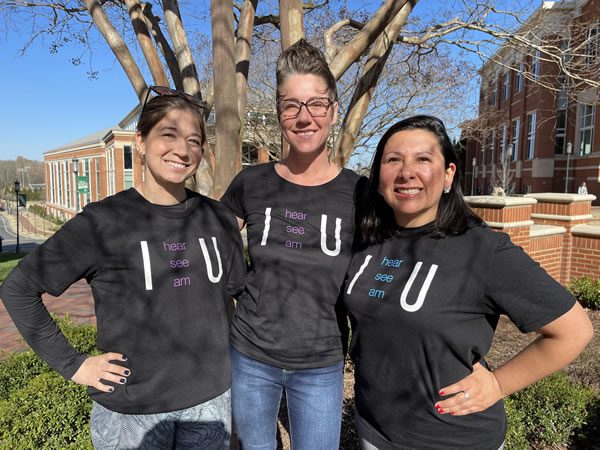CTL workshop leaders committed to seeing, hearing faculty

Faculty support is the mission of the Center for Teaching and Learning, and for a trio of participants in the center’s Active Learning Academy, it has become a personal bonding experience.
For faculty members Susana Cisneros, Julie Cook and Brittany Johnson, a shared interest in active learning brought them together. They discovered common ground and shared feelings, and the friendship and support network they developed through team meetings are what’s going to continue, which will lead to further collaboration.
The faculty trio recently led the workshop, “What We Carry Carries Over to the Classroom.”
Their goal is summed up by their matching T-shirts. They want their colleagues to know, “I hear you, I see you, I am you.”
“Faculty are not alone, and they do not have to carry things alone,” said Cisneros, a senior lecturer in Spanish. “Our experiences outside the classroom enrich the spaces we share with students, and they shape our teaching practices.”
During their workshop, designed as a unique space for faculty to have informal, unscripted, unrecorded and frank discussions, self-care was a topic of conversation. Cook, a senior lecturer in the Department of Writing, Rhetoric and Digital Studies, stated, “Similar to being on an airplane, if in case of emergency, you must apply your own oxygen mask first before helping others. We wanted to provide faculty with an outlet, a support network, and a space for open discussion, so that they could leave feeling heard and supported.”
The three women, from diverse personal and academic backgrounds, learned from one another, often talking about topics beyond active learning. They noted that while personal talks can be risky, with a fear of saying the wrong thing or demonstrating vulnerability, their stories are worth telling and have a healing effect.
“One of the key concepts that our conversations revealed is that to create an active learning environment in our classes, we must be present and in the moment. Any personal stressors we bring into the learning spaces negatively impact our engagement in an active learning setting,” said Cisneros.
Johnson, who is in her first year as an assistant professor in the Biological Sciences Department, is relatively new to the Active Learning Academy. Her goal has been to acquire innovative teaching strategies. “But the most valuable thing I have gained is a network of supportive faculty members. We share a common goal of student success, but we also are invested in promoting one another and strengthening the faculty community.”
Assisting faculty to implement active learning in the classroom
Active learning benefits students and instructors creating academic environments driven by student curiosity, inventive thinking and collaboration.
“Faculty who participate in the Active Learning Academy are assigned to cross-disciplinary teams. Susana, Julie and Brittany really developed a collaborative, innovative relationship, which is what we strive to achieve,” said Jules Keith-Le, a faculty development specialist with the Center for Teaching and Learning. She also is the program manager for the Active Learning Academy. “This faculty trio is discussing future collaborations and assisting their colleagues to implement active learning pedagogy in their classrooms.”
Faculty can apply to join the 2022-23 cohort of the Active Learning Academy. This year, the academy is partnering with the Office of Academic Diversity and Inclusion to focus on integrating active learning methodology and other evidence-based practices that transform student experiences to create equitable learning environments.
Photo courtesy of Bobby Hobgood, director of the Language Resource Center in the Department of Languages and Culture Studies.